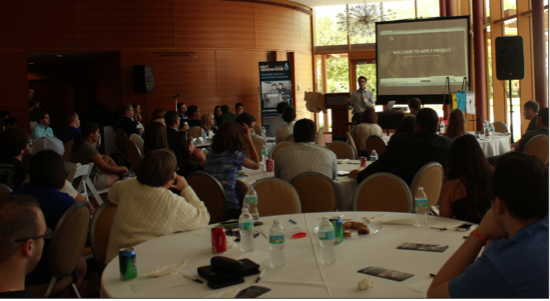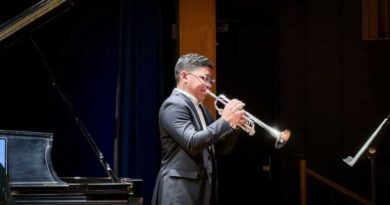A Holocaust Survivor’s Message
By NIKKI COLONNA
Contributing Writer
Holocaust survivor, Katherine Sattler, visited Lynn to share her experience with students and faculty. She inspired many to alter their perception of life after hearing her heartfelt story of her painful path to liberation in 1945.
Living in a small city in present day Ukraine, Sattler introduced the audience to her hardships when the first German soldiers began to take over her town. She was a 14-year-old girl who went to church with her family every Sunday, but that tradition was the first to disappear. Next went her father’s grocery business. Her friends were then lost because she could not be around those who wore the Jewish star.
She remembered how strange German men invaded her house and privacy; moving in and leaving her family of four only able to access one bedroom and the kitchen. Her life lost its order.
“There was nothing we could do about it,” said Sattler. Sattler was eventually completely forced out of her house and put on a cattle car with 75 other people all squished together, heading to an unknown destination. Several perished along the way due to illness or old age. She declared how the stench of death right next to her just emphasized the hopelessness in that travel car.
“We had no idea where we were going,” said Sattler.
A crack of light through the ceiling of the container that Sattler was located in was the only way of knowing whether it was day or night. The only items that her family was able to keep during the journey consisted of a little bit of food, clothes and a pair of shoes.
Upon arrival Sattler, her sister and her mother were separated from her father. She made every effort to stay with her sister and mother. They were moved together to a concentration camp. It was here when she put the responsibility upon herself to take care of them no matter what happened. The camp’s process involved being stripped of all clothes anyone owned, an ice cold shower and the shaving of all hair. Then everyone was provided with the grey uniformed clothing in order to remove all individuality. Her job was to rummage through the mile high piles of clothes that once belonged to those who died on the way over. Off in the distance she could see a smoke stack where the disgusting odor of burning flesh could be smelled for miles. In this pile she found the horrifying evidence of her father’s status; his jacket. “…That’s when I started to cry because I knew everyone was dead,” said Sattler. Her course continued as she trudged along in The Death March on Jan. 18, 1945. Lasting about 3 and a half days, people of all ages marched to a labor camp. Disease, lack of food and exhaustion caused great demise once again.
On May 3, 1945, Sattler, her sister and her mother were liberated.
As of today, Sattler has a different way of looking at life. She is truly full of emotion and enjoys helping people. She thanks God and her youthful innocence for getting her though it all. Her positive way of thinking is shocking to most people, especially after listening to all that she has been through, but is stimulating for anyone to mirror her spirit and love for anyone she meets.
“I never lost faith in God and never lost faith in people,” said Sattler enthusiastically and a smile on her face.




